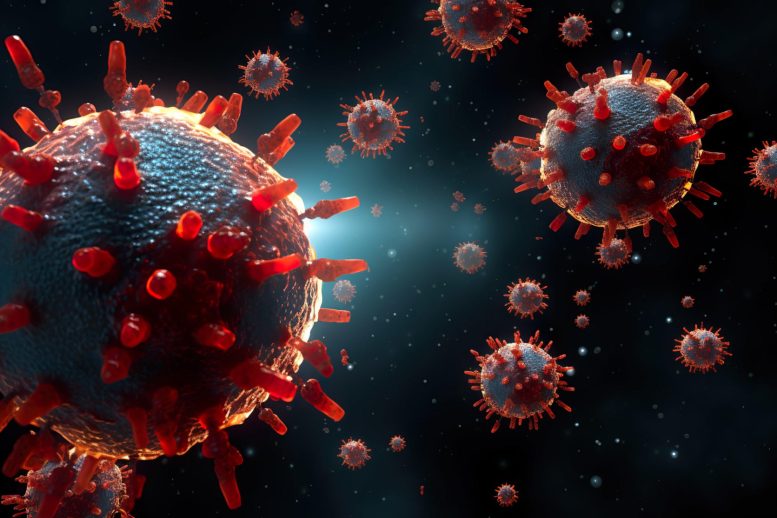
UC San Francisco is set to launch the world’s first tissue bank with samples donated by patients with long COVID. The move follows research indicating that the virus can continue to linger throughout the body and may hold the key to understanding the cause of the debilitating disorder, leading to effective treatments.
By October 2023, an estimated 14% of Americans had or had had long COVID, according to the Centers for Disease Control and Prevention. The disorder may appear as a continuation of the original COVID symptoms or manifest as new symptoms affecting any part of the body. In serious cases, multiple body systems are affected, including the brain, heart, lungs, kidneys, and skin.
Recent studies have shown that in patients with long COVID, the SARS-CoV-2 virus may not fully clear after the initial infection. Instead, the virus remains in what scientists have termed “viral reservoirs,” identified in patient tissue months or even years later. These reservoirs are now believed to be a primary driver of long COVID, provoking the immune system to respond by prompting conditions like blood clotting disorders, inflammation, and cognitive dysfunction.
“Based on our work so far, we believe that long COVID is a tissue-based disease,” said Michael Peluso, MD, principal investigator of the UCSF Long COVID Tissue Program and an infectious disease physician-scientist in the UCSF School of Medicine.
“This program will allow us to comprehensively study the biological processes occurring across tissue compartments – in the blood, gut, lymph nodes, spinal fluid, and bone marrow – in people living with long COVID. This will help us better understand the underlying mechanisms of long COVID,” said Peluso, who co-led recent research with Timothy Henrich, MD, a UCSF physician-scientist, that showed the virus was present in colon tissue up to 676 days following infection.
An effort to expand collaboration with HIV/AIDS, cardiology, and other specialists
Tissue specimens will be acquired from existing and future participants enrolled in UCSF’s LIINC study, and shared with non-UCSF scientists conducting complementary research. The study, which was launched in April 2020 before long COVID was recognized, is open to all adults who have ever tested positive for COVID-19.
“The persistence of SARS-CoV-2 in tissue is a major target for our rapid research and clinical trials,” said Steven Deeks, MD, co-principal investigator of LIINC, professor of medicine in residence at UCSF and an internationally recognized HIV expert. Current clinical trials include a monoclonal antibody – a lab-made protein that effectively attacks viruses – and an antiviral therapy that blocks viral replication.
The UCSF Long COVID Tissue Program is supported by a $3 million grant from the Long Covid Research Consortium of the PolyBio Research Foundation, a nonprofit dedicated to complex chronic conditions, which also funded the LIINC study.
“The UCSF team includes people who helped make HIV and AIDS a treatable disease,” said Amy Proal, PhD, president of PolyBio. “These researchers rapidly pivoted into long COVID research at the outset of the pandemic, leveraging years of experience performing similar research with patients with HIV and AIDS.”
An additional $1.7 million funding from PolyBio will also enable Henrich, and UCSF cardiologist Zian Tseng, MD, to expand their study of sudden cardiac death. Advanced technologies will be used to examine traces of SARS-CoV-2 and related immune changes in tissue samples. Findings may result in recommendations for antiviral treatments for patients who have been exposed to the COVID virus and are at risk for sudden cardiac death.
Reference: “Multimodal Molecular Imaging Reveals Tissue-Based T Cell Activation and Viral RNA Persistence for Up to 2 Years Following COVID-19” by Michael J. Peluso, Dylan Ryder, Robert Flavell, Yingbing Wang, Jelena Levi, Brian H. LaFranchi, Tyler-Marie Deveau, Amanda M. Buck, Sadie E. Munter, Kofi A. Asare, Maya Aslam, Wally Koch, Gyula Szabo, Rebecca Hoh, Monika Deswal, Antonio Rodriguez, Melissa Buitrago, Viva Tai, Uttam Shrestha, Scott Lu, Sarah A. Goldberg, Thomas Dalhuisen, Matthew S. Durstenfeld, Priscilla Y. Hsue, J. Daniel Kelly, Nitasha Kumar, Jeffrey N. Martin, Aruna Gambir, Ma Somsouk, Youngho Seo, Steven G. Deeks, Zoltan G. Laszik, Henry F. VanBrocklin and Timothy J. Henrich, 31 July 2023, medRxiv.
DOI: 10.1101/2023.07.27.23293177